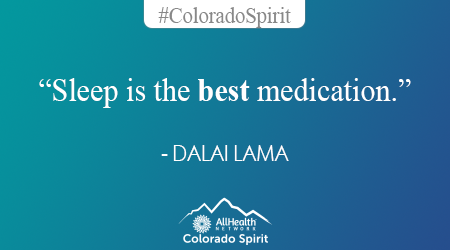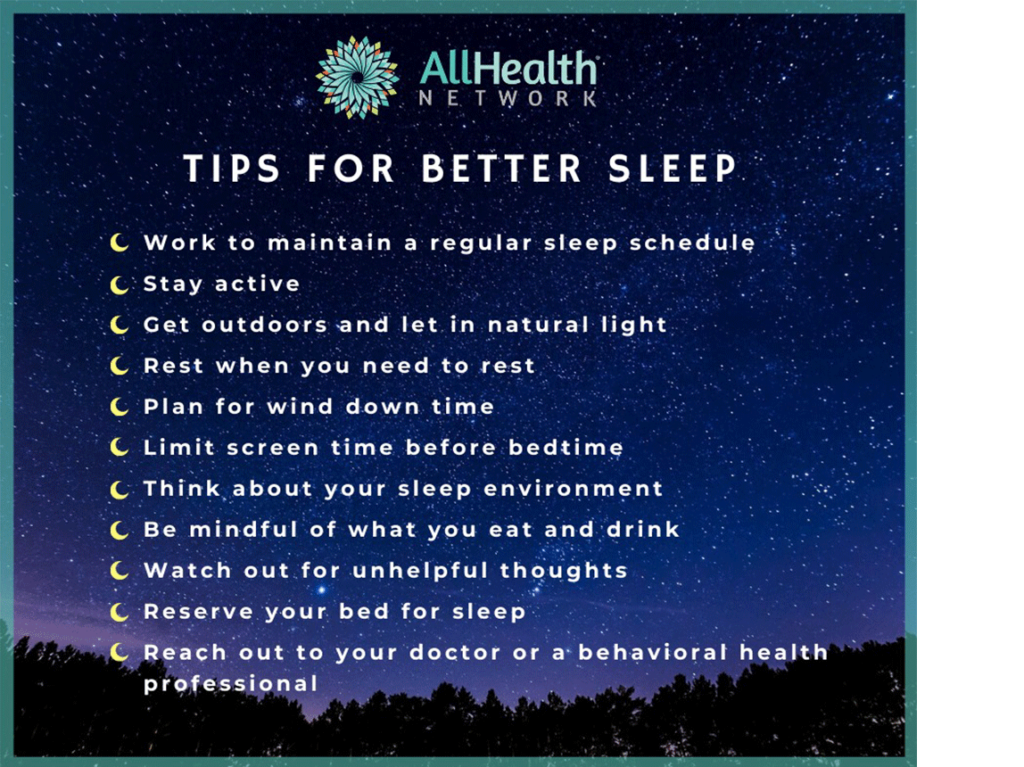Sleep is critical to us as humans
When our sleep is disrupted, lots of parts of our lives become more challenging. We may be more irritable, have difficulty concentrating, feel physically drained, or become overwhelmed more easily. Our sleep is also impacted by stress and anxiety. It can be a problematic cycle: if we are stressed or anxious, sleeping might be more difficult. The lack of sleep then makes managing stress even more difficult. Pre-pandemic, almost a third of adults reported not getting a full night of sleep; given our current environment, we suspect this number is higher now.
Having sleep difficulties?
There is some good news though. Many sleep disturbances can be shifted with behavior changes as opposed to medication. If you are having restless nights, difficulty falling asleep, or difficulty staying asleep, some of these tips might help.
- Work to maintain a regular sleep schedule. Consistent sleep and wake times throughout the week help our bodies develop a regular sleep pattern. It can be tempting to shift your sleep depending on your daily schedule, but this is hard on your body and can interfere with sleep.
- Stay active. Regular, daily exercise can improve sleep patterns. While vigorous exercise right before bed is not recommended, staying active during the day is an important sleep tip.
- Get outdoors and let in natural light. Natural light sends our bodies important cues about when to be awake. Getting outside each day, or at the very least being in a space with some natural light, can help shift a disrupted sleep cycle.
- Rest when you need to rest. It is common to feel exhausted when coping with intense events, so you may need more rest or to rest differently during this time. Relaxing and resting for brief times throughout the day and taking short naps (15-20 minutes) may help. Be mindful of naps longer than this though as longer daytime periods of sleep can interfere with nighttime sleep.
- Plan for wind down time. Spend 30 minutes before bed doing something non-stressful and non-stimulating, such as reading, breathing exercises, meditation, stretching, prayer, writing/drawing, or listening to quiet music. For some people, a warm shower or soaking in a warm
 bath can be helpful. Not only can this help our bodies and minds relax, these activities will become cues to our brain and body that it is time to sleep.
bath can be helpful. Not only can this help our bodies and minds relax, these activities will become cues to our brain and body that it is time to sleep. - Limit screen time before bedtime. The light emitted by many of our electronic devices interferes with our sleep hormones and can create disrupted sleep. Try to avoid all screens for at least an hour before bedtime. If you find you need to do something to distract yourself as you are falling asleep try listening to something instead. Calming music, white noise, guided meditations or breathing exercises, progressive muscle relaxation exercises, podcasts, or audio books can all be substitutes for screen time.
- Think about your sleep environment. Most of us sleep best in cool, dark, and quiet environments. Consider if blackout curtains, white noise, or changing your room temperature might help.
- Be mindful of what you eat and drink as bedtime approaches. Make sure not to eat or drink too much before bedtime. Avoid nicotine, alcohol and caffeine later in the day as they can interfere with deeper sleep cycles. Unless directed by your doctor, avoid sleeping pills.
- Watch out for unhelpful thoughts that can interfere with sleep, such as, “If I don’t get enough sleep, I won’t be able to do anything tomorrow” or “Not sleeping is really unhealthy.” Try to replace these thoughts with new healthy ones such as “I’ll be okay; I’ve done fine with little sleep before.”
- Reserve your bed for sleep. We know this can be challenging if you are working at home and using your bedroom as a makeshift office. At the same time, we rely on cues to help us sleep. If my bed is only for sleeping, it is much more likely that I will be able to rest and sleep there than if I use my bed for work, watching TV, reading the news, AND sleep. Related, if you find yourself in bed and unable to sleep for more than 20 minutes, get up and do something relaxing somewhere else, and then return to bed when you feel sleepy.
- Reach out to your doctor or a behavioral health professional if you are still having sleep difficulties after implementing some adjustments. While there may be health issues impacting sleep, there are also non-medication based interventions like Cognitive Behavioral Therapy for Insomnia that might be helpful.
A quick word about kids: Stress and anxiety impacts their sleep too! Depending on their age, they might not be able to tell you how they are feeling and you might just see changes in sleep patterns. Many of these same tips help children and teens develop healthy sleep patterns too. This article has some additional tips specific to supporting children.
Would speaking to someone help?
AllHealth Network, along with other community mental health centers, is continuing to provide services via telehealth and by phone. Our Crisis Walk-in Center remains open 24/7 and offers in-person care to those experiencing a mental health crisis. For more information and to get connected with our services, please call 303-730-8858. To learn more about what other community mental health centers are doing, please visit the Colorado Behavioral Health Council COVID-19 website.
If you are experiencing a mental health crisis and are in need of immediate assistance, please call the Colorado Crisis Hotline at 1-844-493-TALK (8255) or text TALK to 38255
How do you know if you’re experiencing a mental health crisis? Click here to learn about mental health crisis warning signs to look out for from the National Alliance on Mental Illness (NAMI)


